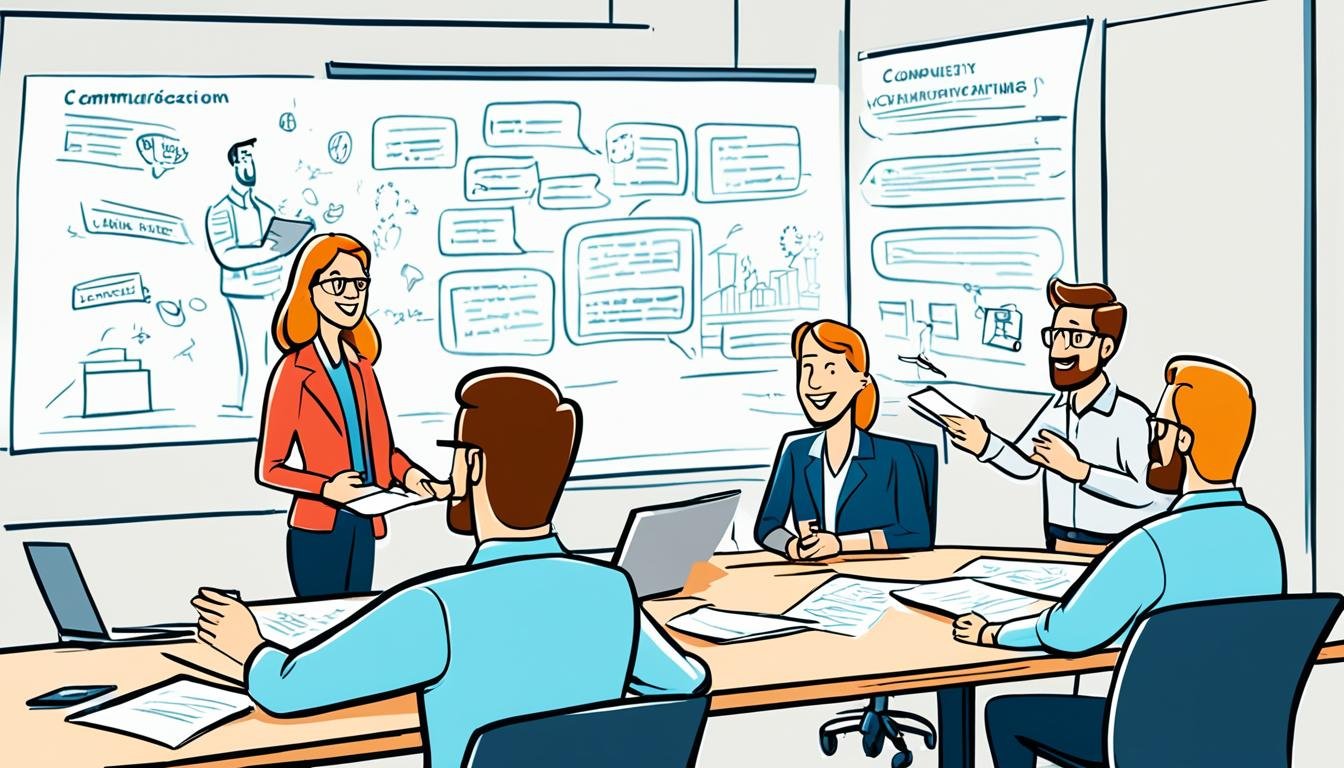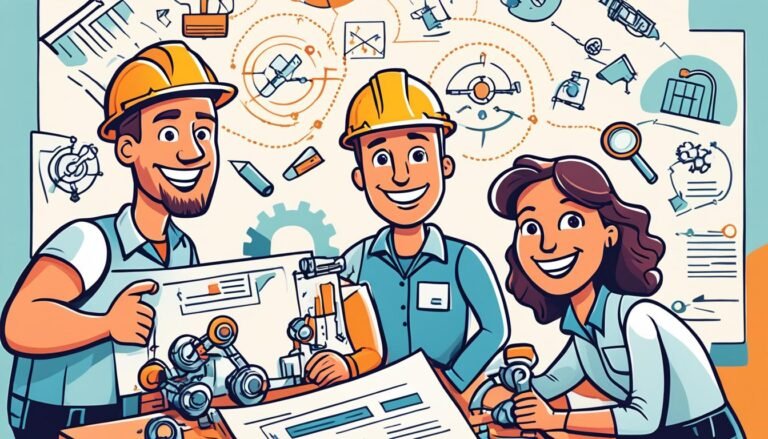Essential Soft Skills for Engineers to Excel
“Technical skills will only take you so far. To go further, you need soft skills – the ability to collaborate, communicate, and adapt. These skills will set you apart as an engineer.”
Engineers are not just experts in their respective fields; they also need a diverse set of soft skills to excel in their careers. While technical knowledge is undoubtedly important, it is the combination of technical expertise and soft skills that truly propels engineers to success. Soft skills enhance collaboration, problem-solving, leadership, and adaptability, allowing engineers to navigate complex projects and work effectively with colleagues and clients.
Key Takeaways:
- Communication: Effective communication is crucial for engineers to convey their ideas, listen actively, and build strong relationships.
- Compassion: Compassionate engineers create a positive work environment and foster strong teamwork.
- Leadership: Leadership skills enable engineers to guide projects and inspire their team.
- Organization: Being organized helps engineers manage their time, meet deadlines, and track project progress.
- Constructive Criticism: Accepting feedback and using it to improve leads to better project outcomes.
Communication
Effective communication is a critical soft skill for engineers. It plays a vital role in ensuring smooth project progress, collaboration with team members, and maintaining strong relationships with clients and stakeholders. Engineers with strong communication skills can present their ideas clearly and concisely, listen actively to understand project requirements, and articulate their thoughts in a way that is easily understood by others.
When engineers communicate effectively, they can avoid misunderstandings, prevent errors, and promote efficient problem-solving. Clear and concise communication helps convey technical information accurately, promoting a shared understanding among project leaders, team members, and stakeholders.
To enhance communication skills in the engineering field, engineers should focus on:
- Improving their presentation skills to deliver engaging and informative technical presentations
- Listening actively to understand others’ perspectives and ensure effective collaboration
- Developing interpersonal skills to build rapport and foster positive relationships
- Adapting their communication style to suit different audiences, such as clients or colleagues from diverse backgrounds
In addition to verbal communication, written communication is equally important for engineers. Clear and concise written documentation, reports, and emails help convey information accurately and efficiently.
Effective communication is not just about speaking, but also listening and understanding the needs of others. When engineers prioritize communication skills, they can better collaborate, problem-solve, and deliver successful projects.
| Benefits of Strong Communication Skills for Engineers |
|---|
| Enhanced collaboration and teamwork |
| Improved project coordination and progress tracking |
| Efficient problem-solving and decision-making |
| Stronger relationships with clients and stakeholders |
Compassion
Compassion is not often associated with the field of engineering, which is often perceived as technical and factual. However, compassion plays a vital role in engineering teamwork, contributing to a positive work environment and successful project outcomes. When engineers show compassion, they create a supportive atmosphere that values understanding and empathy.
Compassionate engineers understand the challenges their team members may face and offer the necessary support and guidance. By being attentive to their colleagues’ needs, they contribute to an inclusive work environment that ensures everyone feels valued and appreciated. This empathetic approach encourages collaboration and fosters a sense of belonging, resulting in increased productivity and innovative problem-solving.
Moreover, compassion extends beyond internal teamwork. Engineers who show compassion are more likely to build strong relationships with clients and stakeholders. Understanding the perspectives and aspirations of these key stakeholders enables engineers to tailor their solutions effectively, resulting in successful project delivery and client satisfaction.
Compassion is the key to unlocking the full potential of engineering teamwork. It strengthens collaboration, builds strong relationships, and elevates project outcomes.
To illustrate the impact of compassion in engineering, consider the following example:
- A team of engineers is working on a complex infrastructure project with tight deadlines. One of the team members is experiencing personal difficulties and is struggling to keep up with the workload. A compassionate engineer takes the initiative to offer support and reassign tasks, lightening the burden on their colleague. This act of compassion not only alleviates stress but also fosters a sense of camaraderie within the team, leading to increased morale and a stronger commitment to project success.
Compassion in engineering goes beyond technical expertise and numerical calculations. It embraces the human aspect of the profession, highlighting the importance of understanding, empathy, and collaboration. By incorporating compassion into their work, engineers can create a harmonious and productive environment that nurtures innovation and drives meaningful change in the engineering field.
Leadership
Leadership skills are invaluable for engineers, particularly when assuming project management or team leadership roles. Effective leaders possess a deep understanding of their team members’ strengths and expertise, enabling them to allocate tasks accordingly. By harnessing the unique capabilities of each team member, leaders can optimize productivity and ensure that projects are executed efficiently.
Leadership is not only about delegation; it’s about leading by example and fostering a collaborative environment. When engineers take the lead, they actively engage with their team, working alongside them to achieve project goals and overcome challenges. By demonstrating a strong work ethic and commitment to excellence, leaders motivate their team members to follow suit, ultimately driving the success of the project.
Great leaders also prioritize communication, ensuring that everyone is on the same page and that information flows seamlessly among team members. By facilitating open and transparent communication channels, leaders foster a collaborative environment where ideas are shared, feedback is received, and conflicts are addressed constructively.
Ultimately, engineers with strong leadership skills not only excel in managing projects and teams but also inspire innovation and create a positive work culture. Their ability to guide and motivate their team members contributes to increased productivity, better decision-making, and ultimately, the successful completion of engineering projects.
Characteristics of Effective Engineering Leaders
- Clear vision: Effective leaders have a clear vision for the project and can communicate it to their team.
- Empathy: A good leader understands the perspective of team members and is empathetic towards their needs and concerns.
- Resilience: Leaders must remain resilient in the face of challenges and setbacks, inspiring their team to overcome obstacles.
- Decision-making: Strong leaders make informed decisions, considering both short-term and long-term implications.
- Flexibility: A leader must be adaptable and open to change, adjusting strategies as needed to achieve project objectives.
- Conflict resolution: Leaders are skilled in resolving conflicts and mediating disagreements among team members, promoting a harmonious work environment.
- Mentorship: Effective leaders guide and mentor their team members, assisting in their professional growth and development.
Organization
Strong organization skills are essential for engineers to effectively manage multiple tasks and projects. By being organized, engineers can streamline their workflow, meet deadlines, and maintain a high level of productivity.
One key aspect of organization for engineers is time management. Efficient time management allows engineers to allocate their time effectively, ensuring that each task receives the attention it deserves. By prioritizing tasks and setting realistic deadlines, engineers can avoid unnecessary stress and deliver quality work.
In addition to time management, engineers should also develop strategies for organizing their schedules and resources. This includes maintaining accurate project documentation, keeping track of important dates and appointments, and managing project milestones. By staying organized, engineers can easily access the information they need, avoid mistakes, and communicate project progress effectively.
As John F. Kennedy said, “Efficiency is doing better what is already being done.” By honing their organization skills, engineers can optimize their workflow and enhance their overall performance.
The Benefits of Organization Skills for Engineers:
- Meeting project deadlines consistently
- Reducing the likelihood of errors and mistakes
- Ensuring smooth project progress
- Enhancing effective communication with team members and stakeholders
By practicing strong organization skills, engineers can effectively manage their time, resources, and projects, ultimately contributing to their success and the success of their teams.
Tips for Enhancing Organization Skills
| Tip | Explanation |
|---|---|
| Utilize project management tools | Software tools like Trello or Asana can help engineers keep track of tasks, deadlines, and project progress. |
| Create a structured workflow | Develop a clear and consistent workflow to ensure that tasks are completed in a logical and efficient manner. |
| Prioritize tasks | Identify and prioritize tasks based on their importance and deadlines. This will help you focus on the most critical tasks first. |
| Keep a detailed calendar | Use a calendar to plan and track your schedule, including appointments, meetings, and project milestones. |
| Maintain a clean and organized workspace | An organized physical workspace can help reduce distractions and improve focus. |
By implementing these tips and practicing effective organization skills, engineers can optimize their workflow, increase their productivity, and excel in their careers.
Constructive Criticism
Feedback is an integral part of the engineering process. As engineers, we should embrace constructive criticism as an opportunity for growth. Accepting feedback positively and implementing suggested improvements can lead to better project outcomes and personal development.
Constructive criticism allows us to refine our work and create the best possible solutions. By actively seeking feedback from colleagues, supervisors, and clients, we open ourselves up to new perspectives and ideas. Collaborating with our team and incorporating their feedback can help us overcome challenges, improve efficiency, and achieve outstanding results.
Receiving feedback in engineering is not about taking criticism personally but rather focusing on the shared objective of producing exceptional work. It requires humility and the willingness to learn from others, acknowledging that no one has all the answers.
“Constructive criticism is vital in engineering. It helps us see blind spots, identify areas for improvement, and ultimately deliver better projects.”
– Ava Smith, Senior Engineer at TechPro
By accepting criticism as an engineer, we demonstrate our commitment to continuous improvement and professional growth. It shows that we value collaboration and the collective expertise of the team. Through feedback, we can refine our problem-solving skills, expand our knowledge, and enhance our ability to meet project requirements.
Ultimately, accepting constructive criticism elevates the quality of our work and helps us become more effective and adaptable engineers.
Teamwork
Teamwork is a vital soft skill for engineers, playing a crucial role in fostering effective collaboration and achieving project success. Engineers must possess strong teamwork skills to work harmoniously with others, communicate effectively, and collectively strive towards a common goal.
By leveraging their teamwork skills, engineers can navigate diverse opinions, resolve conflicts, and ensure that all team members are working together seamlessly. Effective teamwork allows engineers to harness the strengths and expertise of each team member, leading to innovative solutions and efficient problem-solving.
Collaboration in engineering requires open communication channels that allow team members to share ideas, provide feedback, and collectively make decisions. When engineers collaborate effectively, they can leverage their combined knowledge and skills to tackle complex challenges and produce superior outcomes.
Benefits of Effective Teamwork in Engineering
“Teamwork allows engineers to tap into diverse perspectives, leading to enhanced problem-solving capabilities and innovative solutions.”
The benefits of effective teamwork in engineering are multifaceted. It enables engineers to:
- Promote knowledge sharing and skill development: Teamwork creates a supportive environment where engineers can learn from one another, expanding their knowledge and honing their expertise.
- Improve project efficiency: Through collaboration, engineers can streamline processes, optimize resource allocation, and promote efficient project execution, ensuring deadlines are met.
- Foster creativity and innovation: Teamwork promotes the exchange of ideas and encourages out-of-the-box thinking, leading to innovative designs and solutions that push the boundaries of engineering.
- Enhance problem-solving capabilities: By leveraging diverse perspectives and expertise, collaborative engineering teams can tackle complex challenges from various angles, leading to more effective problem-solving methods.
- Build strong professional relationships: Successful teamwork facilitates the development of trust, respect, and camaraderie among engineers, fostering a positive work environment and cultivating long-lasting professional relationships.
Engineers with strong teamwork skills are highly sought after in the industry, as they can effectively navigate diverse projects, collaborate with cross-functional teams, and drive successful outcomes. Developing and nurturing teamwork skills is therefore essential for engineers to excel in their careers and make significant contributions to the field of engineering.
| Key Aspects of Teamwork Skills for Engineers | Examples |
|---|---|
| Effective Communication | Active listening, clear and concise expression of ideas, open and honest communication |
| Collaborative Problem-Solving | Brainstorming, sharing insights and perspectives, integrating different approaches |
| Conflict Resolution | Mediating disagreements, finding common ground, promoting win-win solutions |
| Adaptability | Flexibility in working with diverse teams and adapting to changing project requirements |
| Team Building | Fostering a positive team culture, building trust and collaboration among team members |
Developing and enhancing teamwork skills is a lifelong process for engineers. Engaging in team projects, seeking opportunities for cross-functional collaboration, and actively participating in team-building activities can all contribute to strengthening these essential skills.
Ultimately, engineers who prioritize teamwork skills alongside technical expertise are well-equipped to thrive in the ever-evolving field of engineering, where collaboration and collective problem-solving are paramount.
Creativity
Creativity is an essential soft skill for engineers, enabling them to unleash their innovative thinking and drive groundbreaking solutions. By embracing creativity, engineers can push the boundaries of conventional practices and develop out-of-the-box ideas that revolutionize the engineering landscape.
Engineers who possess strong creative abilities have the power to:
- Generate innovative ideas and concepts that challenge the norm
- Devise unique designs that optimize functionality and efficiency
- Create solutions that address complex engineering challenges
Furthermore, creativity empowers engineers to present their ideas effectively. Visual aids and engaging presentations can help convey their innovative concepts to clients, stakeholders, and their engineering peers.
The ability to think outside the box and propose unique solutions not only sets engineers apart in their field but also encourages a culture of innovation within engineering teams. Creative thinkers bring fresh perspectives to projects, inspiring their colleagues with new possibilities and encouraging collaborative problem-solving.
Innovative Thinking and Collaboration
When engineers embrace innovative thinking, they contribute to a culture of collaboration and drive innovation forward. By combining their technical knowledge with creativity, engineers can approach problems holistically and uncover inventive solutions.
Collaboration in innovative thinking enables engineers to:
- Cross-pollinate ideas with interdisciplinary teams
- Draw inspiration from diverse perspectives
- Formulate creative solutions through brainstorming sessions
“Innovation is the ability to see change as an opportunity, not a threat.” – Steve Jobs
By fostering a creative mindset and embracing innovative thinking, engineers become catalysts for positive change in the field of engineering. They inspire others, challenge established norms, and contribute to remarkable advancements, propelling the industry forward.
Conclusion
In conclusion, soft skills are crucial for engineers to excel in their careers. While technical expertise is essential, skills like communication, leadership, organization, and adaptability play a pivotal role in their success. Engineers with well-developed soft skills can collaborate effectively with team members, solve problems efficiently, and readily adapt to changing project requirements and evolving technologies.
By nurturing these skills, engineers can elevate their careers and make significant contributions to the engineering field. Adaptability, in particular, is a key attribute that allows engineers to navigate uncertainties and challenges. In a rapidly changing industry, engineers who possess adaptability skills can quickly adjust their strategies, embrace new methodologies, and stay ahead of the curve.
Overall, the combination of technical expertise and strong soft skills empowers engineers to thrive in their professional journeys. By continuously honing their communication, leadership, organization, and adaptability skills, engineers can not only excel in their roles but also inspire and lead their teams towards remarkable achievements. Embracing and developing these essential soft skills will undoubtedly set engineers apart in the competitive landscape of engineering.








